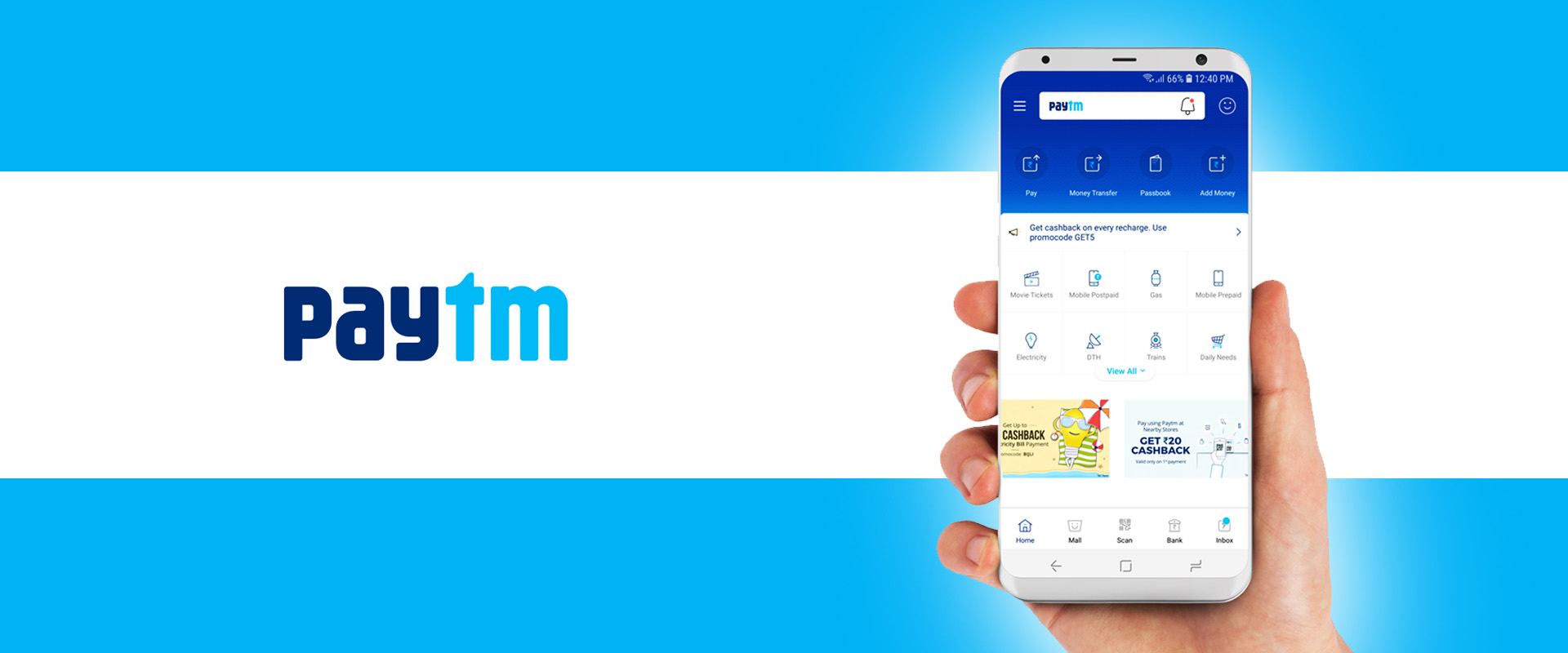Going back more than a decade, you could not even fathom reaching for your phone to make small payments at the local tea shop or grocery store, now the phone replaces the wallet for most Indians. This is all thanks to Paytm, a single brand, a unique product that has revolutionised the fintech sector and started a path to future where e-retail and phone-based transactions is the new normal.
Paytm’s Origins and Entry to Fame
The concept of ‘Pay Through Mobile’ or Paytm was coined by Vijay Shekar Sharma when the brand was established in 2010. The origin for Paytm, however, dates back all the way to 1997 when Sharma sold his first entrepreneurial website ‘Indiasite.net’ and with that money raised as well as a Rs 8 lakh loan, he officially founded One97 Communications in 2000 – Paytm’s parent company.
The digital platform found its genesis in the fintech sector as an Indian e-commerce platform and mobile app that allowed for the payment of small-scale utilities, DTH recharge and the occasional shopping bill. With the increased penetration of smartphones in the country, the app and website have become the face of e-retail as well as mobile-based financial transactions and booking for the majority of Indians. Over the years the range of services that the app and brand cover is wide enough to include most needs. For example, you can transfer funds to bank accounts, pay the electricity bill, book train/bus tickets, make hotel reservations, buy FASTags, get insurance quotes and even do online shopping through Paytm’s Mall (which is an e-commerce platform).
In terms of the clout that Paytm has garnered over the years, it is fair to say it is a considerable amount. Paytm Bank has over 58 million account holders. Paytm Money, a subsidiary platform, is one of the biggest investment platforms in India and a big contributor to the Mutual Funds Industry by way of the Systematic Investment Plans (SIP). Paytm’s platform is one of the few to receive backing and recognition from the Reserve Bank of India (RBI) as a legitimate and secure method of digital transactions.
This in itself gives the brand a lot of strength to its name and has pushed its name to the forefront of the fintech sector, now coming in at a valuation of $16 Billion. Even with big players like Google Pay and PhonePe, Paytm still remains one of the most reliable and versatile e-wallets and e-commerce platforms in India. So much so, that you have most likely heard the phrase, “Paytm Karo” at least once. A fun and catchy jingle that is somewhat of a viral sensation, becoming synonymous with mobile transactions.

‘‘
Paytm was a pioneer in the fintech sector with its revolutionary approach to e-retail and e-commerce as it provided an easy-access platform to all things banking and online transaction related.
Reasons Behind Paytm’s Success
Paytm was successful for a number of reasons, at the core of which stood their accessibility and status as one of the first digital banking and e-retail apps that anyone with a smartphone and internet plan could access. One of the biggest events for the brand was in 2016 when the government of India initiated the demonetisation of large currency notes in the country in an effort to curb the black money that was in circulation. This move essentially pushed citizens to opt for a cashless lifestyle, at least temporarily till normalisation could be achieved. It was following this that Paytm jumped on the bandwagon for #CashlessIndia and #CurrencySwitch, which gave the Alibaba-backed platform a lead over its competitors.
The other reason why the Paytm brand and platform are so popular as a product is the cornucopia of features and options it provides for its users:
Paytm Payments Bank
This feature gives customers all the functionality of a real bank account but a bank you can carry in your back pocket. Customers who make use of this can open a Zero Balance Account with a 2.75 per cent Interest, gain an Automatic Fixed Deposit (FD) with a partner bank when the balance exceeds Rs 1 lakh with an interest rate of 6.50 per cent, experience unlimited and free bank-to-bank money transfers, get a free digital Debit Card for all online shopping purposes and even get a Debit/ATM card with RuPay Platinum benefits.
Paytm Mall
This is a Paytm sub-service and an online catalogue of over 140,000 enrolled sellers that work on a B2C that is loosely based on China’s biggest B2C retailer TMall. Each merchant has to go through Paytm-guaranteed stockroom and channels to ensure buyer trust. Anything from cars and bikes, to clothes and household appliances, can be purchased here. The mall is primarily funded by Alibaba and SAIF Partners.
Paytm Money: Stocks & Mutual Funds Investment App
This is a sister app to the main Paytm e-wallet app which allows you to specifically operate a Demat Account, buy and sell stocks on NSE (National Stock Exchange) and BSE (Bombay Stock Exchange), access NPS (National Pensions System) and even invest in Mutual Funds. This platform offers customers a streamline arena to buy and sell with live NSE and BSE trackers, in-app market research and data schematics etc.
Paytm Digital Gold
This sub-platform is fully dedicated to the investment, purchase and sale of gold. The brand cleverly recognised and made use of the cultural and ritualistic importance of gold amongst the Indian demographic. Clients can get their own Gold Bank Accounts and start investing in the gold market. This is also a feature under the Paytm Money application.
Paytm Mini App Store
This is an innovative approach by the company which offers customers all the user experience of an app store, without the tedious processes of downloading and installing apps to gain access. Instead, it acts as an online directory of services that customers can access and redirect themselves to different corners of the internet to access said services. The categories that the store covers are gifting, food ordering, shopping, games, transport and travel booking, music, healthcare, news and content and even education to name a few.
Essentially the prime reason for the success remains the demonetisation of the large currency bills in India, as well as Paytm’s far-and-wide-reach tactics that cover so many elements of the e-commerce and e-retail sector from insurance, investment, bookings, recharge and online shopping. It was a pioneer in its field as an e-wallet in the Indian context.
How Is Paytm Miles Ahead of The Competition?
There are a number of reasons why Paytm is ahead of the competition, even after all these years and an ever-increasing saturation point in the fintech and e-retail sector. Industry mammoths like Google Pay and PhonePe are among the heavy-hitters in the fintech sector that Paytm has to contend with. The reason as to why it outperforms them is that, while the competition is so heavily focused on bolstering their cashback strategies, Paytm is diverting its funds to as many small businesses and merchants as possible in an attempt to gather them under the brand’s umbrella.
This combined with the company doubling its efforts to introduce better IoT (Internet of Things) devices, will enable small businesses and merchants in tier-two and tier-three cities to easily accept digital payments and make their lives easier.
As of November 2019, Paytm was active in the merchant community in over 2000 cities and towns and 650 districts. The reason that they are able to so readily bring merchants into the fold is that merchants using the app can receive money into their e-wallets without even having a bank account. They can then spend this money at other merchants who operate on the Paytm platform. Effectively, this strategy creates a network within a network and helps bolster the merchant demographic. This was also a crucial focal point in the days following demonetisation when banks were flooded and overwhelmed and businesses were in need of a method that allowed them to conduct transactions with cashless payments.
This heavy boots-on-the-ground approach really helps keep the brand accessible and people-centric which is one of the reasons that the brand is leading the pack.
Another reason why the brand has come so far ahead of the competition, in terms of popularity, is the approach they implemented in their brand awareness campaign. Paytm’s approach is essentially a copy of PayPal’s strategy which was used to incentivise users to spread the word to non-users and in exchange, the non-users will get a cash reward and Paytm gets cheap advertising. After seeing the success of the cashback incentive scheme, the competition followed the lead and started doing the same. Having said that, there is an advantage here as the one who did it first did it best.
Beyond the schemes and networking, if you look at the design and layout of the app you will find that there is, in fact, no obvious logout button or option. It is there, it is just buried deep within the app’s design. The reason this works in Paytm’s favour is that users will most often just remain logged in, which means less time and energy spent trying to input passwords or pin codes and more time doing the actual transactions and staying active on the app. This makes for a very efficient process for the day-to-day usage and drives up the customer engagement numbers for the company.
Above all this, however, the core of why Paytm is at the top of its game in the fintech sector is a combination of having been the first to recognise a gap that needed closing, effectively marketing and networking with the backbone of the Indian economy (SMEs and merchant businesses), covering a wide array of services as mentioned above and of course, making for a democratised e-retail and e-commerce platform which gave easy access to the market, stocks and digital banking/payments for the average person.
Although the competition is slowly catching up, Paytm has the financial backing, the strategic skills and the years of experience under its belt to keep its head above these competition-heavy waters.

‘‘
It is one of the few and first mobile applications to receive recognition from the Reserve Bank of India as a safe and secure platform for consumers to conduct their transactions on.
To Sum Up
The application found its beginnings as one of India’s first mobile-first consumer service e-commerce and retail platforms in the fintech sector. Though initially it was meant for small scale utilities, DTH recharge and grocery shopping, the application saw a boom in popularity thanks to its ease of access and usability. It was a pioneer in its field.
Though investors were not too keen on this kind of concept coming out the gate, given that India’s telecom infrastructure was still developing in 2010, Sharma spent out of his own pocket in order to bring this idea to life. All these efforts brought the application and the brand to the forefront as digitalisation, the smartphone penetration and demonetisation took hold of the country, which further served as the cornerstones upon which the expansion of the brand was built.
Going forward the brand will most likely be playing a more intensive role in the SME and merchant sectors to involve more small businesses under its brand umbrella as they constitute a large chunk of the market ecosystem in India. This will only further open doors to the brand as new opportunities and venues present themselves to be bridged while the competition is left to play catch-up.
For more inspirational brand and product stories like this check out our Inspire Section




